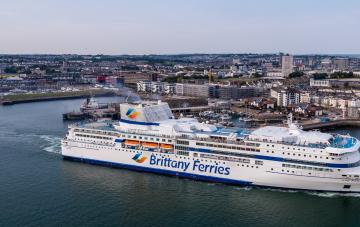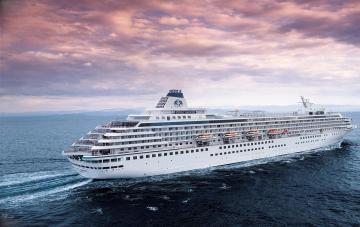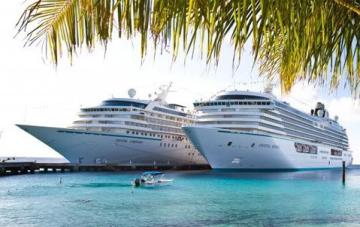
Are you planning your next vacation and can't decide between a cruise or ferry travel? Both options offer unique experiences and benefits, so it's important to consider what type of traveler you are and what you're looking for in a trip. Let's dive into the differences between cruise lines and ferry travel to help you make the right choice for your next adventure!
Cruise lines: If you're seeking an all-inclusive vacation with a touch of luxury, a cruise line might be the perfect option for you. With a variety of onboard amenities, entertainment options, and dining experiences, cruise ships are like floating resorts. Whether you're looking to relax by the pool, indulge in gourmet cuisine, or enjoy live performances, cruise lines offer a wide range of activities for all ages.
Comparing Cruise Lines and Ferry Travel
When it comes to choosing a mode of transportation for your next vacation, you may find yourself deciding between a cruise line and ferry travel. Both options offer unique experiences and advantages, so it's important to understand the differences before making your decision.
Here is a comparison of cruise lines and ferry travel:
1. Itinerary
Cruise lines typically offer a wide range of itineraries that include multiple destinations, allowing you to explore different cities and countries in one trip. Ferry travel, on the other hand, usually operates between two specific ports and is more focused on transportation rather than sightseeing.
2. Amenities
Cruise lines are known for their luxurious amenities, such as onboard restaurants, swimming pools, spas, and entertainment options like live shows and casinos. Ferries usually offer fewer amenities, with basic facilities like seating areas, snack bars, and restrooms.
3. Duration
Cruise vacations tend to be longer, ranging from a few days to several weeks, while ferry travel is usually shorter, with trips lasting a few hours or overnight. If you're looking for a quick getaway or a day trip, a ferry may be a more convenient option.
4. Cost
Cruise lines generally have higher upfront costs due to the all-inclusive nature of their packages. These costs often cover accommodations, meals, and onboard activities. Ferries, on the other hand, tend to have lower upfront costs, but you may need to pay for additional services or amenities separately.
5. Flexibility
Ferry travel offers more flexibility in terms of departure times and frequency, allowing you to choose a schedule that fits your needs. Cruise lines generally operate on specific departure dates and have a fixed itinerary, offering less flexibility in terms of travel dates and destinations.
6. Experience
Artigos populares
Cruise lines provide a complete vacation experience, with a focus on relaxation, entertainment, and exploring different ports of call. Ferry travel, on the other hand, offers a more straightforward transportation experience, ideal for those who prefer a no-frills approach.
Conclusion
Ultimately, the choice between a cruise line and ferry travel depends on your preferences, budget, and travel goals. If you're looking for a luxurious vacation with many amenities and destinations, a cruise line may be the right choice. On the other hand, if you're seeking a convenient and cost-effective mode of transportation, ferry travel may be more suitable. Consider your priorities and make an informed decision based on what you value most in a travel experience.
Factors to Consider when Choosing between Cruise Lines and Ferry Travel
When deciding between cruise lines and ferry travel, there are several factors to consider. Each mode of transportation offers its own unique advantages and disadvantages, so it's important to weigh your options before making a decision.
Here are some key factors to consider when choosing between cruise lines and ferry travel:
1. Destination
The first factor to consider is your destination. Cruise lines typically offer a wide range of destinations, including popular tourist spots, exotic islands, and scenic river cruises. On the other hand, ferry travel is often limited to specific routes and may not offer as many choices in terms of destinations. Consider where you want to go and whether a cruise line or ferry will better suit your travel plans.
2. Duration of Travel
Another important factor to consider is the duration of your travel. Cruises are known for their longer itineraries, ranging from a few days to several weeks. This allows you to fully immerse yourself in the travel experience and explore multiple destinations. Ferry travel, on the other hand, is often shorter in duration, making it more suitable for quick getaways or day trips.
3. Amenities and Entertainment
Cruise lines are known for their luxurious amenities and onboard entertainment options. From swimming pools and spa facilities to live shows and casinos, cruise ships offer a wide range of activities to keep passengers entertained during their journey. Ferries, on the other hand, may have limited amenities and entertainment options, focusing more on providing a simple and efficient mode of transportation.
4. Cost
Cost is always an important factor to consider when planning any trip. Cruises tend to be more expensive due to the all-inclusive nature of the experience, including meals, accommodation, and entertainment. Ferry travel, on the other hand, is often more affordable and allows you to have more control over your expenses. Consider your budget and what you are willing to spend on your travel experience.
5. Flexibility
Flexibility is another factor to consider when choosing between cruise lines and ferry travel. Cruises typically operate on fixed schedules, with set departure and arrival times. This may limit your flexibility in terms of when and how long you can stay at each destination. Ferry travel, on the other hand, often offers more flexibility in terms of departure times and allows you to customize your itinerary to suit your needs.
Ultimately, the choice between cruise lines and ferry travel depends on your personal preferences, budget, and travel plans. Consider these factors carefully and choose the option that best aligns with your needs and desires for an unforgettable travel experience.






